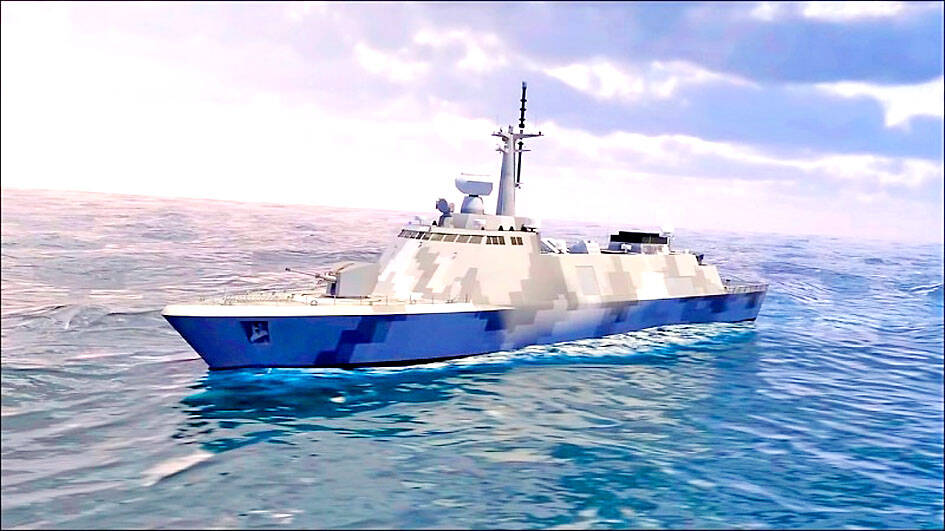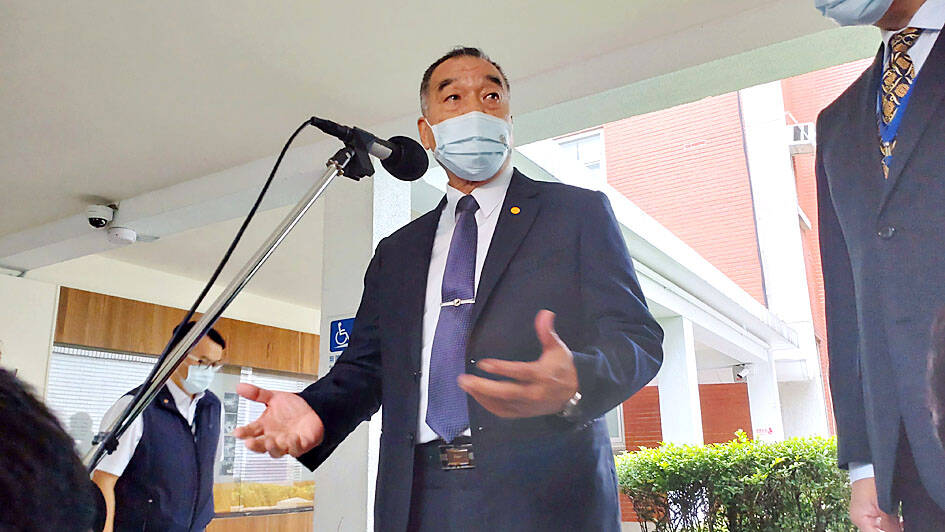A revised “Zhenhai Project” (震海計畫) would see the construction of two 2,000-tonne frigates with anti-air and anti-submarine capabilities, instead of a planned 4,500-tonne next-generation missile frigate, a budget proposal sent to the legislature yesterday by the Ministry of National Defense showed.
The streamlined plan, now named the “Naval Next-Generation Frigate Buildup Project,” would provide two ships, trading size for ease of production, the ministry said, adding that the anti-air ship is expected to enter service by 2025 and the anti-submarine ship by 2026.
The vessels would have a maximum displacement of 2,500 tonnes each, would be able to operate in winds up to level 8 on the Beaufort scale, and would be equipped with mid-range anti-air missiles, higher-range supersonic anti-ship missiles, a 76mm gun, a Phalanx close-in weapon system and depth charges or torpedoes, the budget report said.

Photo courtesy of the Chungshan Institute of Science and Technology
The ministry had initially budgeted NT$24.5 billion (US$768.8 million at the current exchange rate) from 2019 to 2026 for the project, but said it no longer addresses the navy’s needs following multiple delays.
Chinese Type 056 Jiangdao-class (江島) corvettes and a Type 053H3 Jiangwei-class (江衛) frigate have been entering Taiwanese waters since early August.
Dispatching naval vessels to monitor intruding Chinese ships has been taking a toll on the nation’s aging fleet, the ministry said, giving as an example a 50-year-old refitted Knox-class frigate, which serves as the navy’s primary anti-submarine ship.

Photo: Yang Cheng-yu, Taipei Times
However, the legislature’s Foreign Affairs and National Defense Committee expressed concern about the project’s execution and is to hear a briefing on it from the ministry today.
Work on a prototype anti-air frigate is scheduled to begin in May next year and the first phase of construction is expected to be completed by the first quarter of 2024, the budget proposal said.
The vessel would be launched by the fourth quarter of 2024 and delivered to the navy by the third quarter of 2025, it said.
Work on a prototype of the anti-submarine frigate is expected to begin in April 2025 and the initial phase of construction is scheduled to be completed by the fourth quarter of that year, the proposal said.
The ship would be launched in the fourth quarter of 2025 and delivered to the navy by the second quarter of 2026, it said.
Separately, Minister of National Defense Chiu Kuo-cheng (邱國正) told lawmakers that frequent Chinese drone incursions into Taiwan’s air defense identification zone are causing stress to the point that Taiwan might consider such incursions a “first strike.”
China’s military exercises have done away with unspoken accords between the two sides of the Taiwan Strait and contributed to heightened risk of a war, Chiu said.

CHAOS: Iranians took to the streets playing celebratory music after reports of Khamenei’s death on Saturday, while mourners also gathered in Tehran yesterday Iranian Supreme Leader Ayatollah Ali Khamenei was killed in a major attack on Iran launched by Israel and the US, throwing the future of the Islamic republic into doubt and raising the risk of regional instability. Iranian state television and the state-run IRNA news agency announced the 86-year-old’s death early yesterday. US President Donald Trump said it gave Iranians their “greatest chance” to “take back” their country. The announcements came after a joint US and Israeli aerial bombardment that targeted Iranian military and governmental sites. Trump said the “heavy and pinpoint bombing” would continue through the week or as long

TRUST: The KMT said it respected the US’ timing and considerations, and hoped it would continue to honor its commitments to helping Taiwan bolster its defenses and deterrence US President Donald Trump is delaying a multibillion-dollar arms sale to Taiwan to ensure his visit to Beijing is successful, a New York Times report said. The weapons sales package has stalled in the US Department of State, the report said, citing US officials it did not identify. The White House has told agencies not to push forward ahead of Trump’s meeting with Chinese President Xi Jinping (習近平), it said. The two last month held a phone call to discuss trade and geopolitical flashpoints ahead of the summit. Xi raised the Taiwan issue and urged the US to handle arms sales to

BIG SPENDERS: Foreign investors bought the most Taiwan equities since 2005, signaling confidence that an AI boom would continue to benefit chipmakers Taiwan Semiconductor Manufacturing Co’s (TSMC, 台積電) market capitalization swelled to US$2 trillion for the first time following a 4.25 percent rally in its American depositary receipts (ADR) overnight, putting the world’s biggest contract chipmaker sixth on the list of the world’s biggest companies by market capitalization, just behind Amazon.com Inc. The site CompaniesMarketcap.com ranked TSMC ahead of Saudi Aramco and Meta Platforms Inc. The Taiwanese company’s ADRs on Tuesday surged to US$385.75 on the New York Stock Exchange, as strong demand for artificial intelligence (AI) applications led to chip supply constraints and boost revenue growth to record-breaking levels. Each TSMC ADR represents

State-run CPC Corp, Taiwan (CPC, 台灣中油) yesterday said that it had confirmed on Saturday night with its liquefied natural gas (LNG) and crude oil suppliers that shipments are proceeding as scheduled and that domestic supplies remain unaffected. The CPC yesterday announced the gasoline and diesel prices will rise by NT$0.2 and NT$0.4 per liter, respectively, starting Monday, citing Middle East tensions and blizzards in the eastern United States. CPC also iterated it has been reducing the proportion of crude oil imports from the Middle East and diversifying its supply sources in the past few years in response to geopolitical risks, expanding